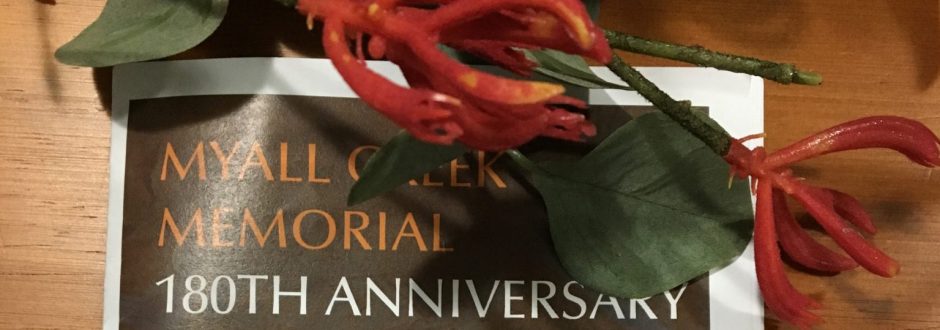Inspired by a visit last year to the Myall Creek Massacre Memorial in northern NSW, Colleen Keating recently wrote a poem which she read at the Myall Creek Memorial Gathering on June 10, 2018 – the 180th anniversary of the massacre.
BY Colleen Keating
“History despite its wrenching pain
cannot be unlived,
but if faced with courage,
need not be lived again.” (Maya Angelo)
there’s something in the shining light
that lends itself to thoughts of hope
perhaps it is a brashness – the way it glows
so cheerfully in this cloudless winter time
perhaps the way it dresses up the land
catches blue kingfishers on their wing
festoons the leaves the rocks the trees
today it lights the darkest claw of time
burns away clouds of brutal wrong
touches blood-stained earth
of blame of shame
too long consumed
too many years too many tears
one hundred and eighty years
now together we walk this way
the Myall Creek Memorial Way
the light plays the red gravel of its track
and flickers on tiny wrens in nearby scrub
there’s a quietness amidst camaraderie
swish of ropes yells grapple of chains
are stilled now
murdering rage and gall are quieted
smell of gun powder spent
yet screams that cried that stark cold night
still sigh amidst the sway
of stringy bark and eucalypt
there’s something in the shining light
that lends itself to thoughts of hope
perhaps it is the cleansing smoke the way
we catch the mica glint on granite stone
and how we stop and read and bow our heads
no longer in the blinding dark and listen
to a peoples heart and our shared history
Author’s note:
It was late Sunday afternoon on June 10, 1838, when a gang of 12 stockmen brutally slaughtered 28 Aboriginal men, women and children who had been camping peacefully on the Myall Creek cattle station, Northern NSW.
The Myall Creek massacre is only one of many massacres of the Frontier Wars right across Australia from the early days of British settlement. However, it was the first time those responsible were arrested, charged, tried and held to account.
To me it is a pivotal moment in Australian history, for it was no longer acceptable to kill Aboriginal people. They were still killed and there were many more massacres, but they needed to be hidden and not reported.
I see recognition of this massacre as one small step for our Indigenous history and one giant step for Australia history. Of course, today we need to take another step, and that is recognition of our First Peoples with a First Nation voice in the Australian Constitution.
